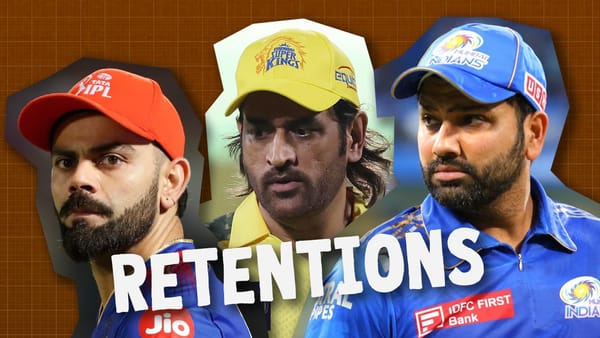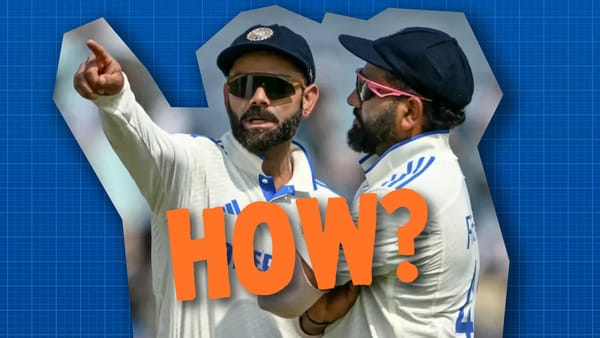West Indian Freelancers
For a very long time West Indian cricketers have had to travel to get paid.
This is the transcript of episode six, season one of Double Century. My podcast on the history of cricket.
SE1EP6 - West Indian freelancers
— Jarrod Kimber (@ajarrodkimber) 8:36 PM ∙ Nov 20, 2020
How West Indian cricketers have always had to travel overseas to be paid what they are worth.
Two Australians, one a former legend, and another a respected captain, got involved when a West Indian had decided that he would play for a team in a foreign league over representing his country.
The two Australians pleaded with him, they understood the finances, but how would it look, choosing money over country. This player eventually relented.
Garfield Sobers played for the West Indies instead of club cricket in Lancashire. The problem of West Indians having to choose between shoring up their financial positions and playing for their the West Indies is not a new one.
Welcome to Double Century. This week we look at how West Indian cricketers have always come to other countries to get the money they deserve. While many believe it to be a modern problem, from Learie Constantine, the first West Indian legend until today. It has been a struggle for the West Indian cricketers to get the money their talents deserve.
There was an incredible player from the West Indies called Constantine. He toured England twice while averaging 25 with the bat and 13 with the ball, though he didn’t bowl that much, as he was a keeper as well. He made a hundred at Lord’s, Wisden said it was a dashing and faultless display. There is no doubt Lebrun Constantine was a player, and luckily for him he was fit enough to play his last game at 48, sharing the field with his son, Learie. Lebrun was known as Old Cons, and he never played a Test, as West Indies weren’t a Test nation, this grandson of a slave, had a few sons who showed potential, but only one was Learie.
Or as he ended up, Baron Constantine. Learie’s rise in cricket was actually stunted by his father, who perhaps because he hadn’t made money from the game, steered his son towards an office job. Learie’s first game had his uncle, his second was his father.
His style of cricket was not the English way; it was a style that would be a gift to cricket for years to come. He attacked, he was reckless, he was beautiful, he was athletic, he was the West Indies. But Learie wasn’t about changing the game, he was incredibly pragmatic, he saw cricket as a way to improve his life. England might have still been every bit as racist as his Trinidad. Still, him being a good cricketer also meant something, that he could transcend his background, his skin colour. Learie left his first tour to England - before the West Indies were a Test nation - with a mission to improve his game. It was his fielding that people really respected. Constantine was like three men in the covers, like a cheetapus (cheetah octopus hybrid). He was everywhere, and when his batting or bowling wasn’t right, he would get picked to block out cover. Constantine was smart enough to know that being a good cover fielder wouldn’t be enough to achieve his dream of playing as a professional in the UK. So he added pace to his bowling, worked on playing slightly less crazy shots, and even trained himself as a slip fielder to conserve energy for his bowling.
So while the West Indies were the fourth team to play a Test match, their opening bowler was really putting out an audition tape. He wasn’t looking for Test glory; he was looking for a job.
Even before the Test, Constantine had been a success. He’d won a match in seven hits against Derbyshire and made his maiden First Class hundred at Essex. But it was at Middlesex that Constantine left the biggest impact.
The crowds came to Lord’s to see him. In the West Indies’ first innings he entered the wicket well behind the follow on target, so he smashed his fifty in 18 minutes. A few minutes after he was 86, the follow on was smashed, and he had scored over 50 more than his teammates.
He took the new ball in the second innings, Middlesex were bowled out for 136. Constantine bowled fast. Only the great Patsy Hendren, with his Test average almost at 50, could withstand him. For a while. Constantine ended with 7/57. Five batsmen were bowled. At one point he took 6/11 in six overs. The West Indies had to chase over 250. Their top order all got starts but kept getting out. At seven in walked Learie. They still needed more than half the total. Constantine batted for an hour, exactly 60 minutes. He made 103 and broke a bowler’s hand in that magic hour. Epic hour. One of the great hours in cricket history. The hour of Learie Constantine. The West Indies beat Middlesex by three wickets. Five years later Denis Compton started playing for Middlesex. According to him the players were still talking about Learie’s match.
The West Indies lost all three of their Tests to England on that tour. All by an innings. Constantine took the first Test wicket for the West Indies. Jack Hobbs said it was one of the fastest spells he’d ever faced. At the end of the tour Constantine had made the most runs, taken the most wickets and held the most catches of any of the West Indians.
Nelson Cricket Club in the Lancashire leagues contacted Constantine and offered him a professional contract. Constantine had done it; he had earned himself a career.
CLR James, one of the greatest writers of all time, and a close friend of Constantine wrote. “he had revolted against the revolting contrast between his first-class status as a cricketer and his third-class status as a man”. So he moved to Lancashire to make a career on and off the field for himself, and as James put it “honour [and] a little profit”. His next Test was in 1930 at home.
When the West Indies won their first ever Test series. Constantine made a 90 to set amp a win, took the wicket to clinch the series and took 15 wickets at 13. But this isn’t why people remember him. That’s because of what he did outside the field. During the war he became a UK government welfare officer, he played in fundraising matches. Before one game, he went to a hotel he had booked in London, the Imperial. When he arrived, they made a fuss about him being black, and offered him only one night, and not the four he had booked. Because they wouldn’t let black people in the hotel. They eventually let him stay at another hotel. But Learie wouldn’t let it go. He took it to the courts, it made the parliament as well, and he demanded England to confront its racist attitudes.
During this time he also worked with West Indian migrants to help them with their work conditions and employment. After the war he coached, commentated and wrote about cricket while he studied law. He went back to Trinidad, as he was still worried about the way blacks were treated, so he ran for parliament and became the minister for communication of Trinidad. Constantine did not seek re-election, and instead became Trinidad’s High Commissioner to London. In 1962, he was knighted. Constantine lost his post as High Commissioner after speaking out about a Bristol bus company that would not employ blacks. The house of Lord’s appointed him the first black man to receive peerage in 1969. In 1971 he passed away. He was given the Trinity Cross, Trinidad’s highest honour, and a state funeral. At Westminster Abbey, they had a memorial for him. All that, it’s just so much, what an incredible life. And I love that he used his cricket ability to change the world. But, I also wish he could have been paid what his talent deserved.
As good as Constantine was, he was nothing compared to Garfield Sobers. He was, beyond comprehension, his first hundred was a world record, his best innings was at the MCG and didn’t even count as a Test. He hit six Sixes in an over, and people talked about the catches that he took like they’d discovered a new planet. Ray Robinson called him “evolution’s ultimate specimen in cricketers”. Sobers was also the first globetrotting professional cricketer. His job was playing cricket on whatever continent he was needed. He once played in Rhodesia and said he would have played in South Africa if only people would have stopped giving him grief about it.
Recently I had an argument with a modern cricketer about him and Kallis. He couldn’t understand how the two could be compared. But then I told him that Sobers bowled twice the overs of Kallis. He was a legitimate frontline batsman and bowler. Not just on talent, but game after game he had to lock down both roles, what a workload to give your most talented player. But to work as a cricketer, Sobers ended up at Radcliffe, in Lancashire because they had the money. Imagine LeBron James or Lionel Messi heading off to the north of England to ply their trade. What a remarkable thing he had to do to be paid for being the greatest cricketer in the world.
West Indian cricketers continued to play in English leagues, but they also started appearing in County cricket. It was seen as a finishing school, but from a financial point of view, this was the ultimate, to get a contract here allowed you to be a professional, helping your game and your standard of living. And then there was the Packer World Series
While there was open warfare from the England and Australian boards, the West Indian board allowed their players to be involved, meaning they kept their team. But there was also a follow on from the Packer era. As Packer actually wanted a better level of professionalism, he hired the West Indies a trainer Dennis Waight. The West Indian players still talk about the change he made them. So here again was the West Indians getting a chance to be paid what they deserved, but also getting better. When cricketers weren’t professional in their preparation or on permanent contracts. Many of the West Indian cricketers played in England, Australia and at home, they had training help, and they become the world’s first 12-month cricket team.
In the 80s cricket teams travelled to South Africa for money. Australia and Sri Lanka had cricketers form sides, England sent two. Mike Gatting, Geoffrey Boycott, Graham Gooch and Mike Haysman were some of the names involved. While they were suspended or ostracised as you may have noticed, they have been pretty much forgiven. There was also a reason they took this money, even the English cricketers, the best paid, were not rich, they were getting ok pay for a fun job, so they were ripe to be sucked in by a good offer. And cricketers aren’t usually experts in politics.
The West Indies sent two tours. This rebel team included one of the fastest bowlers ever, Sylvester Clarke. World Cup final star Collis King. One of the original fast four, Colin Croft. Alvin Kallicharan And the inventor of the off cutting slower ball Franklyn Stephenson. These are proper players, and their international careers stopped because of these tours, and they struggled to get work afterwards. Many of the rebel players became homeless or drug addicts, even for the best of them ended up as outsiders.
The most notable is Colin Croft. Croft would have been remembered as a legend; a brutal, fast legend. A man who bowled wide of the crease to aim the ball at a frightening angle at the batsman. In 27 tests he took 125 wickets at 23. He was a monster. He could have been a legend. Instead he is the face of the unforgiven. It wasn’t long ago he was working in a supermarket. When asked about the rebel tours, Viv Richards said, “I would rather die than lay down my dignity”. No one who knew him believes otherwise. But Viv was a political person, most of them were just normal cricketers trying to get paid. It cost them more than it was worth.
And now it has happened again. At first with the Kolpak situation, and then T20. Due to many reasons, Tino Best has suggested racism, but I also think the decline of West Indies red ball cricket, teams didn’t make as many offers to West Indians for Kolpak. But even then still ten of them got contracts. And they were experienced players, perhaps not automatic starters, but guys who could have come in for a period late in their career and given stability, or used their experience. Guys like Corey Collymore, Ottis Gibson and Ravi Rampaul are great examples of this. But this was very really seen as a problem, and that’s because at the exact same moment something far bigger occurred.
We think of the West Indies as one group because of cricket, but obviously each island - and non-islands - is different. It was Trinidad that first worked out T20 cricket, but while that all started with the Champions League at the top level, it was actually before then that it became a big deal. Windball is a game of 12 overs with a slightly lighter ball. You can read about it in cricket 2.0. But essentially it’s a game of cricket where you have to smash the ball, and so it was of little surprise looking back that Trinidad were the place that seemed to get T20 before everyone else. And these were the days when Chris Gayle was overlooked for the IPL draft. But after Trinidad, Gayle, and the first World T20 win for the West Indies, it was a free for all.
Now young West Indies cricketers are given IPL trials based on a handful of CPL games, and for the first time the money is big. There is now an entire industry around these players, agents, trainers, physios, dieticians, because of what they are worth. Because of the free market of cricket, they are finally getting what their talents are truly worth, but it comes at a cost, and that has been the amount the play for the West Indies.
None of this gets into the political issues of West Indies cricket, but many of them were made worse by the fact the players now had power, they could go somewhere else and get paid more. The West Indies team essentially became a place to get noticed for T20 jobs. And this led to people calling them mercenaries, or saying they turned their back on their nations. I think if anything this podcast has proved that a nonsense idea that is.
What changed was the market for them, Learie, Sobers, those in County Cricket, the Packer guys, the Rebels, they all had to make a living, some chose wisely, others less so, but in the end, you only play this game for a short time. And if this is your chance at providing for yourself or your family, you have to take it.
When I was General Manager of St Lucia Stars I had a cricketer from the West Indies trying to get a CPL job by calling me weekly. Now he knows I am no longer with them, but that I still talk to coaches a lot and do consultancy work and analysis. So now he only calls me every fortnight. This guy is a good cricketer, but the position he plays happens to be not massively in vogue, and there is a player at his national level who is just better than him.
But he’s getting on now, and he knows that hitting up his phone is as important as what he does on the field. He would love to represent his country, and the West Indies, but he also is over 30, and has no other skills, so if I offered him the chance to represent an Iranian XI for a decent wage, he’d be on the first flight. That doesn’t make him a mercenary, just a man with talent who needs to make money from them.
Double Century is written and narrated by me, Jarrod Kimber. It’s produced by Nick McCorriston. And my fact-checkers were Bertie Moores and Abhishek Mukherjee.
This episode was made possible by our supporters on Patreon.




